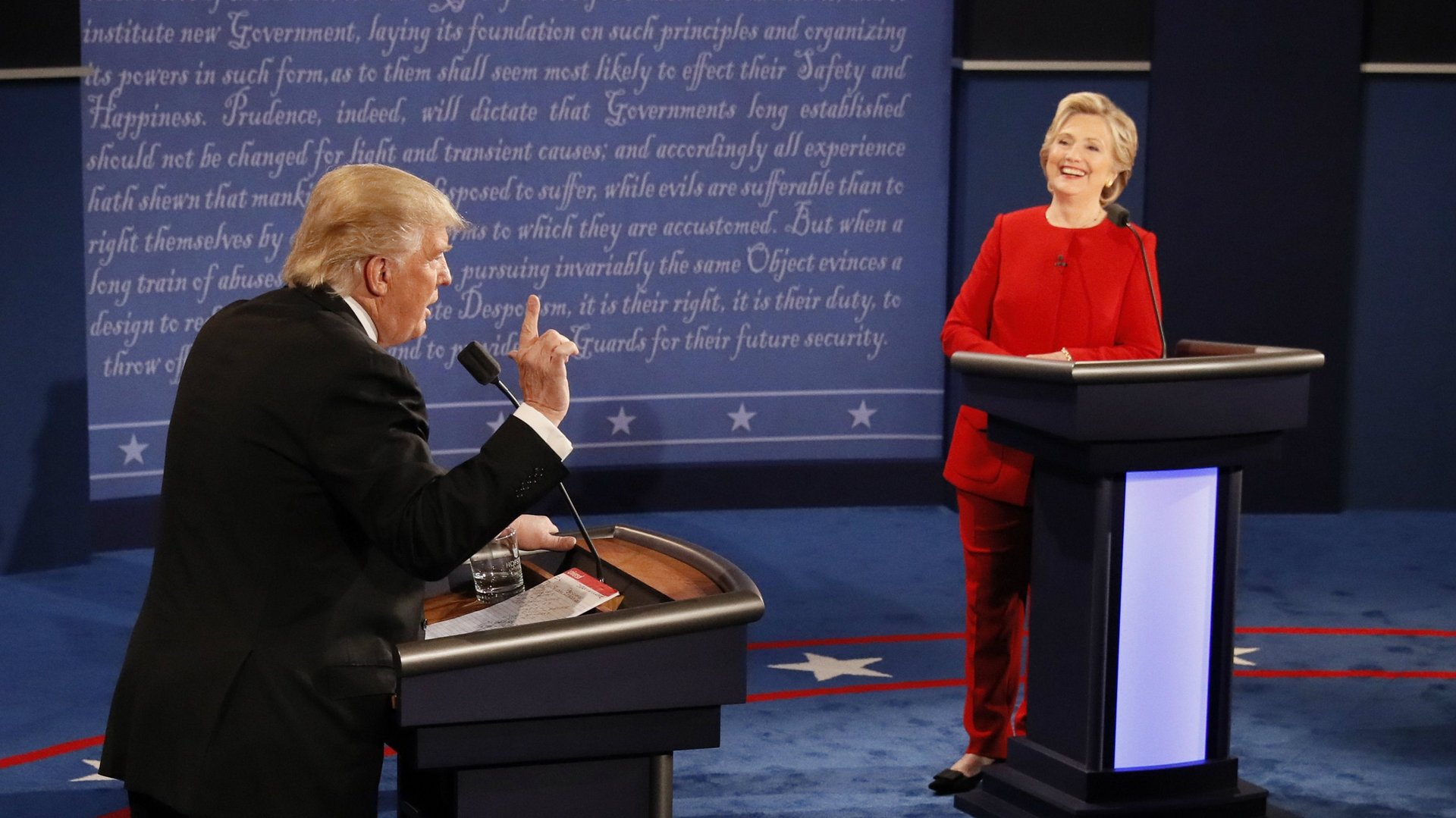A casting director’s advice on how Hillary Clinton and Donald Trump should audition for president
Tonight at 9pm ET, Hillary Clinton and Donald Trump will square off in the second of three US presidential debates. This round will be a town-hall style debate in which undecided American voters will pose questions alongside moderators Anderson Cooper and Martha Raddatz, from CNN and ABC, respectively.


Tonight at 9pm ET, Hillary Clinton and Donald Trump will square off in the second of three US presidential debates. This round will be a town-hall style debate in which undecided American voters will pose questions alongside moderators Anderson Cooper and Martha Raddatz, from CNN and ABC, respectively.
It was already going to be can’t-miss TV, but the debate will have a heightened sense of theater in the wake of the bombshell video released on Friday of Trump making vulgar, predatory comments about women in 2005.
How the candidates perform in this type of setting will likely have as much to do with how they present themselves as it will with their responses.
Anthony Pichette, an on-camera casting director with more than 15 years of experience casting for TV commercials, online videos, and other projects, weighed in on how he’d advise the candidates to audition for the presidency this Sunday. (Full disclosure: Pichette said he is leaning toward Clinton.)
Respect the voters
“We see ourselves in each one of these people asking questions,” said Pichette, on-camera casting director at Sidecar Casting, part of audio post-production company Sound Lounge. ”You can’t be too aggressive.” And you certainly can’t interrupt or speak over them, as the candidates have done to the moderators in the previous presidential and vice presidential debates.
On the contrary, Pichette expects the candidates to be exceedingly gracious at the town-hall debate. Clinton and Trump might thank people for their questions, or praise them for asking. They might repeat the questioners’ names in their responses to show they were really listening. They might make eye contact when responding, walk closer to the people, or speak as if they empathize with them.
“Anything that shows they’re very close and connected to the common voter,” said Pichette. “They want to seem relatable.”
Even before the video surfaced, it was going to be interesting to see how Trump performed in this kind of environment. He’s shown he can rally an audience, but has not yet proven himself in more intimate settings. Now he’ll have to really resist his impulse to attack.
“He has to treat Hillary with the most respect he can give,” Pichette said. “He can’t be aggressive to her or any woman at all.”
For Clinton, the town-hall style debate could present a real opportunity for her to convince uncertain voters that she sees and understands them.
Keep calm and carry on
For the undecided voters who are leaning toward voting for Trump, they want to know that he can keep his cool under pressure.
A lot of that is conveyed through body language. In the last debate, Pichette said Trump was hunched over, closed up to the microphone, and leaned into the podium.
“It came across as an aggressive tactic,” he said, like “‘This is mine. Everything here is mine.'”
Trump would appear more relaxed if he stood up a little straighter, spoke slower, kept his hands steady, and threw in a small smile every now and then, Pichette said.
Give us a little smile
Generally, smiling is a good thing. Pichette says he often directs talent to smile on the second or third take of a shoot to make them seem more relatable. But during the first presidential debate, Clinton smiled a bit too much. And it turned some folks off.
To the Clinton supporter, her smiles in reaction to Trump’s comments said, “Is this guy serious?”
But to the casual observer, and perhaps the undecided voter, the smiling could have made Clinton appear nervous or unsure of herself. Public speakers sometimes use smiling as a way to take a beat and ground themselves when they’re nervous.
“You can’t do it too long or it looks like the Cheshire cat,” said Pichette, referring to the Alice in Wonderland character. “She was lingering a little long. … If it extends for a really long time, maybe she’s not as confident.”
All eyes are always on them
Both candidates would do well to remember that all eyes will be on them at all times. Even when the camera isn’t, the eyes of the audience will be. Clinton and Trump’s facial expressions, body languages, and tones of voice need to appear relaxed, reassuring, and relatable, which is no easy task while defending their qualifications for becoming the US commander in chief.
“If they’re leaning toward Trump, they just want to know that he’s not going to blow up the world,” said Pichette of undecided voters. “If you’re leaning toward Hillary, they just want a reason to get excited for her.”